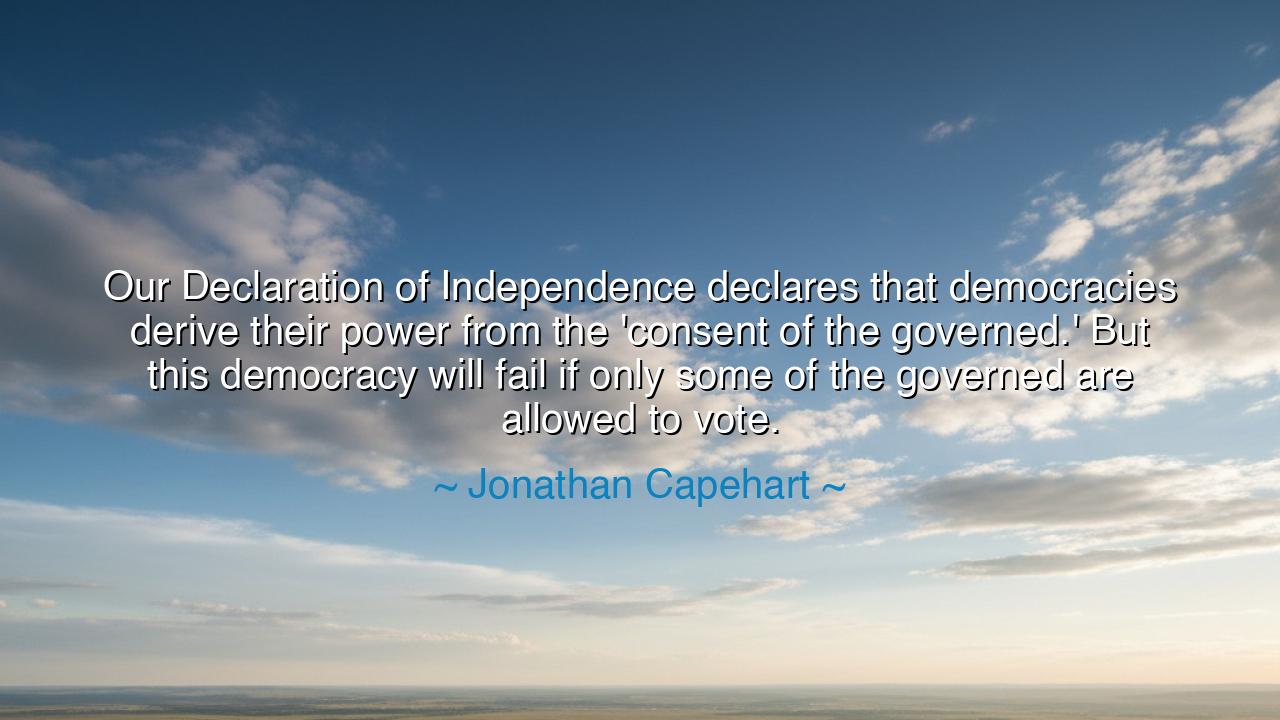
Our Declaration of Independence declares that democracies derive
Our Declaration of Independence declares that democracies derive their power from the 'consent of the governed.' But this democracy will fail if only some of the governed are allowed to vote.






The journalist and thinker Jonathan Capehart spoke with clarity and moral fire when he said: “Our Declaration of Independence declares that democracies derive their power from the ‘consent of the governed.’ But this democracy will fail if only some of the governed are allowed to vote.” In this simple yet profound statement, Capehart reminds us that the heart of democracy is not found in monuments or flags, but in the sacred act of consent — the people’s collective voice. For when that voice is silenced, when any part of the governed is denied its say, democracy ceases to be a living truth and becomes a hollow illusion. His words are both a warning and a call — a call to vigilance, to justice, and to the preservation of the soul of liberty.
The origin of Capehart’s quote lies in the very foundation of the American Republic, in the immortal words penned by Thomas Jefferson in 1776: that governments derive “their just powers from the consent of the governed.” These words were not written lightly — they were a declaration of moral rebellion against tyranny, a covenant between the people and their rulers that power must always flow upward, never downward. Yet Jefferson’s words were born into a world that had not yet fulfilled their meaning, for millions were denied the right to give that consent — women, the enslaved, the poor, and those without property. America’s promise was great, but its practice incomplete. Capehart, centuries later, points his torch back to that ancient promise, reminding us that its fulfillment is not finished — that the work of freedom is ongoing, not accomplished.
Throughout history, the battle for the right to vote has been one of the noblest and most perilous struggles of humankind. It is the thread that binds generations — from the patriots who rose against monarchy to the abolitionists, suffragists, and civil rights leaders who risked all to extend the promise of democracy to every soul. Consider the story of Fannie Lou Hamer, a humble sharecropper from Mississippi, who stood before the Democratic National Convention in 1964 and declared, “I am sick and tired of being sick and tired.” She had been beaten, jailed, and threatened simply for seeking the right to vote. Yet she spoke with the unyielding strength of freedom’s spirit, demanding that America live up to its own creed. In her courage, we see the living echo of Capehart’s truth — that democracy dies when voices are excluded, but it lives again each time the silenced dare to speak.
To say that democracy derives its power from the consent of the governed is to affirm a sacred equality — that every man and woman, regardless of wealth or station, holds within their vote the same divine weight. It is a recognition that no government can claim legitimacy unless it honors the will of all its people. But when barriers are placed before the ballot box — through law, fear, or deceit — that sacred balance is broken. The governed become subjects once more, and liberty becomes the privilege of the few. Thus, Capehart’s warning strikes to the heart: a democracy that excludes cannot endure, for its foundation rests upon injustice, and injustice is the destroyer of nations.
The ancients understood that power divorced from virtue leads always to decay. In Athens, the birthplace of democracy, when the citizens grew indifferent to the duty of participation, the city fell prey to demagogues and tyrants. Likewise, in our own age, when apathy or exclusion erodes the voice of the people, freedom withers. The vote is not merely a right; it is a sacred responsibility — the instrument through which the governed breathe life into their government, shaping its course as a potter shapes clay. Without it, there can be no consent, no accountability, and no true self-rule.
Capehart’s words also carry the weight of prophecy, for he sees not only the past, but the danger of the future. When democracy is wounded — when participation is restricted, or truth is drowned by lies — it begins to rot from within. A people divided by distrust can no longer govern themselves wisely. But when every citizen’s voice is heard, when inclusion triumphs over exclusion, democracy renews its strength. It is like a great tree whose roots deepen each time the rain of justice falls upon it.
And so, let this teaching stand: the measure of a free nation is not how loudly it proclaims liberty, but how equally it grants it. The right to vote is the breath of democracy; to deny it is to suffocate the Republic itself. Each generation must guard that breath as sacred, must ensure that the torch of participation is never dimmed. Let every citizen, young and old, rich and poor, understand that their voice matters — not as a token, but as the cornerstone of freedom.
For in the end, as Capehart reminds us, democracy cannot be inherited; it must be chosen, renewed, and defended. The governed must not merely be ruled — they must rule themselves, together, in justice and equality. When all are heard, the nation stands firm. But when even one voice is silenced, the chorus of liberty falters. Let us, then, keep faith with the promise of the Declaration — that all men and women, being created equal, must be equally heard. For only then shall the consent of the governed truly mean the consent of all.






AAdministratorAdministrator
Welcome, honored guests. Please leave a comment, we will respond soon